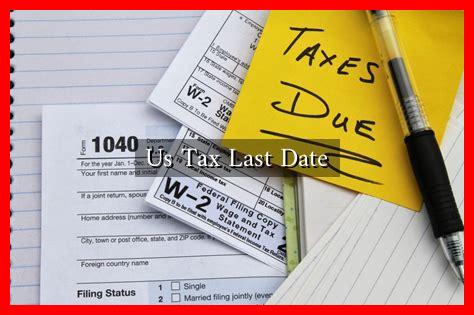-
Table of Contents
Understanding the US Tax Last Date: A Comprehensive Guide
Tax season can be a stressful time for many Americans, and knowing the last date to file taxes is crucial for avoiding penalties and ensuring compliance with the law. This article will explore the significance of the US tax last date, the implications of missing it, and tips for timely filing.
The Importance of the Tax Filing Deadline
The tax filing deadline in the United States is typically set for April 15 each year. However, if this date falls on a weekend or a holiday, the deadline may be extended to the next business day. Understanding this deadline is essential for several reasons:
- Avoiding Penalties: Failing to file your taxes on time can result in significant penalties. The IRS imposes a failure-to-file penalty, which can be as high as 5% of the unpaid taxes for each month your return is late.
- Interest Accrual: In addition to penalties, interest on unpaid taxes begins to accrue from the due date until the tax is paid in full.
- Refund Delays: If you are expecting a tax refund, filing late can delay the receipt of your money.
Key Dates to Remember
While April 15 is the primary deadline for most taxpayers, there are other important dates to keep in mind:
- January 31: Deadline for employers to send out W-2 forms to employees.
- April 15: Standard deadline for individual tax returns (Form 1040).
- October 15: Extended deadline for those who filed for an extension.
For more detailed information on tax deadlines, you can visit the IRS website.
Consequences of Missing the Deadline
Missing the tax filing deadline can have serious repercussions.
. Here are some potential consequences:
- Financial Penalties: As mentioned earlier, the IRS can impose hefty fines for late filing.
- Legal Issues: In extreme cases, failure to file taxes can lead to criminal charges, especially if the IRS suspects tax evasion.
- Loss of Refund: If you do not file your return within three years of the due date, you may lose your right to claim a refund.
Tips for Timely Filing
To avoid the pitfalls of late filing, consider the following tips:
- Start Early: Begin gathering your documents and preparing your return as soon as you receive your W-2 forms.
- Use Tax Software: Consider using tax preparation software to streamline the filing process and minimize errors.
- File for an Extension: If you need more time, file for an extension before the April deadline. This gives you until October 15 to file your return, but remember that any taxes owed are still due by April 15.
Case Study: The Impact of Late Filing
Consider the case of John, a self-employed graphic designer who missed the April 15 deadline. John had been busy with client work and neglected to file his taxes on time. As a result, he faced a 5% penalty on his unpaid taxes, which amounted to $500. Additionally, he had to pay interest on the amount owed, which added another $100 to his total bill. This experience taught John the importance of timely filing and the need to prioritize his tax obligations.
Conclusion
Understanding the US tax last date is essential for all taxpayers. By being aware of key deadlines, the consequences of late filing, and strategies for timely submission, individuals can avoid unnecessary penalties and ensure compliance with tax laws. Remember, starting early and staying organized can make a significant difference in your tax filing experience. For more information and resources, visit the IRS website.





